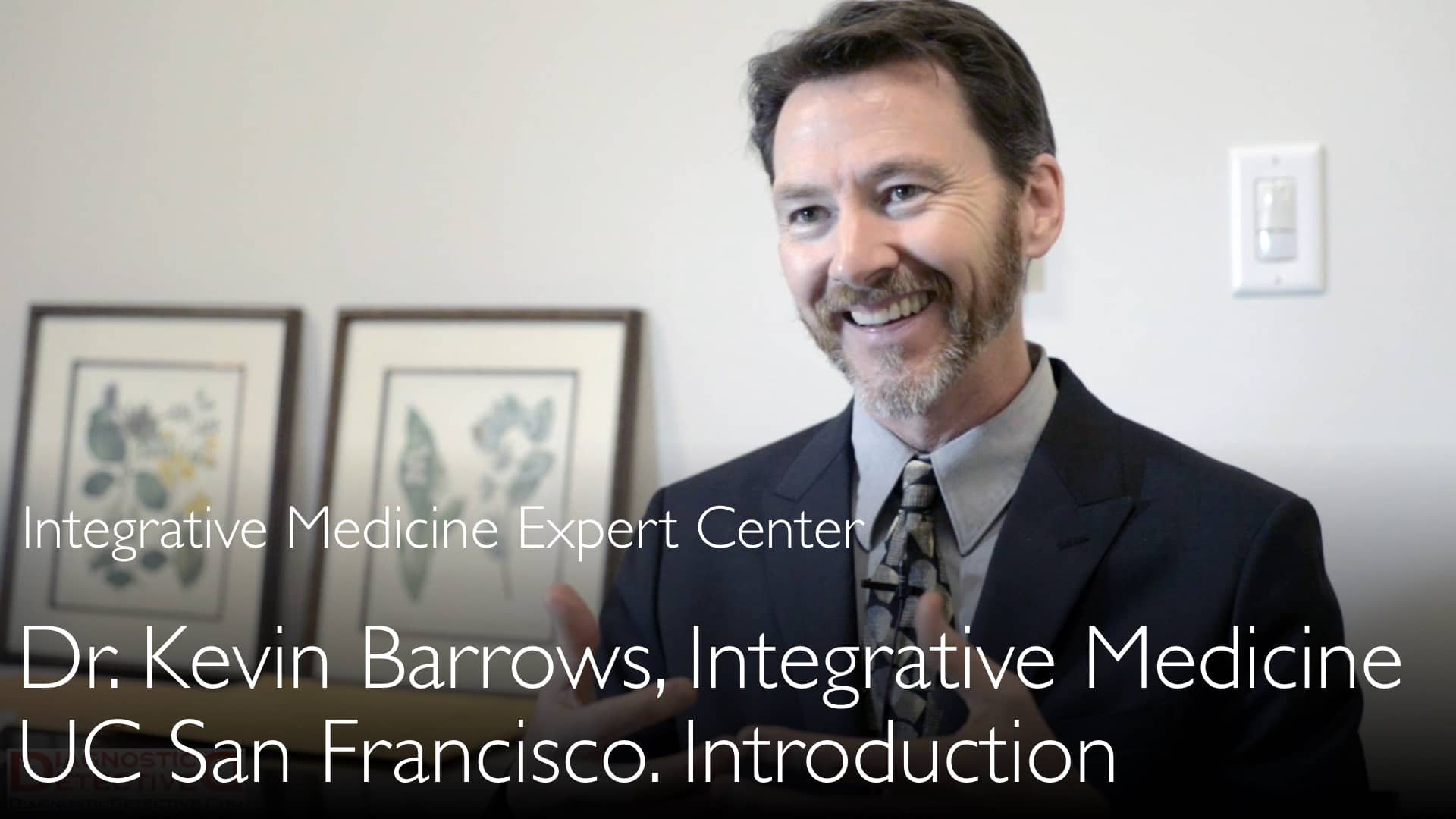Tohtori Kevin Barrows, MD, integratiivisen lääketieteen johtava asiantuntija, käsittelee kokonaisvaltaisten hoitomenetelmien hyötyjä masennuksen ja ahdistuksen hoidossa. Integratiivinen lääketiede voi vähentää lääkityksen tarvetta ja parantaa potilaan osallistumista omaan hoitoonsa. Menetelmiin kuuluvat mindfulness-meditaatio, hengitysharjoitukset ja ohjattu mielikuvaharjoittelu, jotka auttavat kohdatessa sekä psyykkisiä että fyysisiä tekijöitä mielenterveyshäiriöissä. Tohtori Barrows korostaa potilaan ympäristön, henkisten uskomusten ja elämäntapatekijöiden – kuten auringonvalon saannin ja säännöllisen liikunnan – huomioimisen merkitystä. Integratiivinen lääketiede tarjoaa kattavan strategian mielenterveyshoidon tulosten parantamiseksi ja voi samalla lievittää perinteisten lääkkeiden aiheuttamia sivuvaikutuksia.
Integratiivisen lääketieteen lähestymistavat masennukseen ja ahdistuneisuuteen
Hyppää osioon
- Integratiivisen lääketieteen hyödyt mielenterveydelle
- Mindfulness-meditaatio masennuksen hoidossa
- Hengitystekniikat ahdistuneisuushäiriöissä
- Kokonaisvaltaiset lähestymistavat mielenterveyteen
- Lääkkeistä riippuvuuden vähentäminen
- Ympäristö- ja elämäntapatekijät mielenterveydessä
- Koko tekstitys
Integratiivisen lääketieteen hyödyt mielenterveydelle
Integratiivinen lääketiede tarjoaa kokonaisvaltaisen lähestymistavan mielenterveyden häiriöihin, kuten masennukseen ja ahdistuneisuuteen. Lääketieteen tohtori Kevin Barrows korostaa, että nämä menetelmät voivat mahdollistaa lääkeannosten alentamisen ja aktivoida potilaita ottamaan aktiivisemmin osaa hoitoon. Sisällyttämällä terapioita kuten mindfulnessia ja hengitysharjoituksia integratiivinen lääketiede kohdistaa hoitoa sekä mieleen että kehoon, mikä parantaa mielenterveyshoidon tuloksia.
Mindfulness-meditaatio masennuksen hoidossa
Mindfulness-meditaatio on keskeinen osa integratiivista lääketiedettä masennuksen hoidossa. Lääketieteen tohtori Kevin Barrows selittää, että mindfulness auttaa potilaita tunnistamaan ja muokkaamaan negatiivisia ajatusmalleja, mikä antaa heille enemmän hallintaa mielentilaan. Tämä käytäntö opettaa potilaita hallitsemaan masennustaan edistämällä tietoisuutta ja valinnanvapautta ajatusprosesseissa.
Hengitystekniikat ahdistuneisuushäiriöissä
Hengitysharjoitukset ovat tehokas keino hallita ahdistuneisuushäiriöitä. Lääketieteen tohtori Kevin Barrows huomauttaa, että nämä tekniikat auttavat tasapainottamaan autonominen hermosto, vähentäen stressiä ja ahdistuneisuutta. Yksinkertaiset käytännöt kuten ohjattu mielikuvaharjoitus ja hypnoosi voivat myös tukea mielenterveyttä edistämällä rentoutumista ja stressin lievittämistä.
Kokonaisvaltaiset lähestymistavat mielenterveyteen
Lääketieteen tohtori Kevin Barrows korostaa sielun ja henkisten uskomusten huomioimisen tärkeyttä integratiivisessa lääketieteessä. Ottamalla huomioon potilaan sosiaalisen ja hengellisen yhteisön integratiivinen lääketiede tarjoaa kokonaisvaltaisen lähestymistavan mielenterveyteen. Tämä näkökulma sisältää ympäristötekijöiden arvioinnin ja varmistaa, että potilailla on tukevat verkostot.
Lääkkeistä riippuvuuden vähentäminen
Integratiivinen lääketiede voi auttaa vähentämään lääkkeistä riippuvuutta sisällyttämällä vaihtoehtoisia hoitomuotoja. Lääketieteen tohtori Kevin Barrows käsittelee, kuinka potilaat voivat usein alentaa lääkeannoksia tai välttää lisälääkitystä käyttämällä integratiivisia lähestymistapoja. Lääkkeiden vähentäminen voi minimoida sivuvaikutuksia ja parantaa kokonaisvaltaista hyvinvointia.
Ympäristö- ja elämäntapatekijät mielenterveydessä
Ympäristö- ja elämäntapatekijöillä on ratkaiseva rooli mielenterveydessä. Lääketieteen tohtori Kevin Barrows korostaa auringonvalon saannin, ravitsemuksen ja liikunnan merkitystä masennuksen ja ahdistuneisuuden hoidossa. Nämä tekijät vaikuttavat merkittävästi mielialaan ja ovat olennainen osa integratiivisen lääketieteen strategiaa mielenterveyden tukemisessa.
Koko tekstitys
Lääketieteen tohtori Anton Titov: Kokonaisvaltaiset lähestymistavat mielenterveyden häiriöiden hoitoon antavat potilaille mahdollisuuden osallistua aktiivisemmin hoitoonsa. Joskus integratiivinen lääketiede johtaa alhaisempiin lääkeannoksiin. Integratiivinen lääketiede masennukseen ja ahdistuneisuushäiriöihin on tehokasta.
Miten integratiivista lääketiedettä voidaan käyttää mielenterveyden häiriöiden hoidossa? Miten integratiivinen lääketiede auttaa ahdistuneisuudessa? Mikä on kokonaisvaltainen lähestymistapa masennuksen hoitoon ilman lääkkeitä? Kuinka lääkeannoksia voidaan vähentää ahdistuneisuuden hoidossa käyttämällä mindfulness-meditaatiota ja hengitysharjoituksia? Integratiivinen lääketiede auttaa sielua parantumaan.
Lääketieteelliset toiset mielipiteet varmistavat, että masennus- ja kaksisuuntaisen mielialahäiriön diagnoosit ovat oikeita ja täydellisiä. Lääketieteellinen toinen mielipide auttaa myös valitsemaan parhaan kokonaisvaltaisen luonnollisen hoitostrategian masennukseen ja kaksisuuntaiseen mielialahäiriöön. Hae lääketieteellinen toinen mielipide masennuksesta ja kaksisuuntaisesta mielialahäiriöstä varmistaaksesi, että kokonaisvaltainen luonnollinen hoito on paras.
Mielenterveys on valtava ja jatkuvasti kasvava ongelma, erityisesti nyky-yhteiskunnassa ja kaupunkiväestöissä. Perinteisesti lääkeyhtiöt lähestyivät sitä reduktionistisesti pyrkien muuttamaan aivojen välittäjäaineiden epätasapainoa psyloaktiivisilla kemikaaleilla. Joskus se on erittäin tehokasta, mutta hoidon vaikutus ei aina vastannut odotuksia. Merkittäviä sivuvaikutuksia esiintyi usein, ja lääkkeet saattoivat muuttaa potilaiden persoonallisuutta kokonaisvaltaisesti.
Lääketieteen tohtori Anton Titov: Voisitko keskustella siitä, miten integratiivinen lääketiede hyödyttää mielenterveyssairauksista kärsiviä potilaita? Mitkä ovat menetelmät ja esimerkit, joissa integratiivista lääketiedettä voidaan soveltaa?
Lääketieteen tohtori Kevin Barrows: Totta kai. Farmaseuttisilla lääkkeillä voi olla rooli, mutta meidän on oltava tietoisia niiden todellisesta näyttöaineistosta. Osa negatiivisesta näyttöaineistosta piilotettiin aluksi, mutta ne voivat olla hyödyllisiä. Muistakaa, että kyse on integratiivisesta lääketieteestä. Perinteinen lääketiede on voimakas ja auttaa usein potilaiden elämää, joten haluamme käyttää sitä harkiten aiheuttamatta vahinkoa tai korkeita kustannuksia.
Integratiivinen lääketiede on erityisen hyödyllistä mielenterveyden alalla. Mindfulness on hoitomuoto, joka on erittäin hyödyllinen mielenterveydelle ja jolla on todennäköisesti eniten näyttöaineistoa. Se muuttaa vallan lokaatiota. Sen sijaan, että olisivat riippuvaisia pillereistä, potilaat ottavat enemmän vastuuta ja kontrollia. Mindfulness auttaa potilaita tunnistamaan masentuneita ajatusmalleja ja käyttämään valintamahdollisuuksia ajattelussaan.
Integratiivinen lääketiede auttaa myös ahdistuneisuushäiriöissä ja muissa mielenterveyden häiriöissä. Stressillä, tai autonomisella epätasapainolla, on suuri osuus, jossa sympaattinen hermosto on aktivoitunut ja parasympaattinen hermosto aliaktiivinen. Sen uudelleen tasapainottaminen on erittäin hyödyllistä monille mielenterveyden häiriöille.
Mieli-keho-lääketieteessä on monia terapioita, kuten yksinkertaiset hengitystekniikat, ohjattu mielikuvaharjoitus ja hypnoosi. Integratiivinen lääketiede kohdistuu myös sieluun tarkistamalla hengelliset uskomukset ja yhteisöyhteydet. Ympäristötekijät kuten auringonvalo ovat tärkeitä mielialalle, kuten näkyy kausittaisessa mielialahäiriössä (SAD). Ravitsemus ja liikunta auttavat myös.
Näiden muiden terapioiden tuominen voi vähentää tarvetta farmaseuttiselle hoidolle. Lääkeannosten alentaminen tai farmaseuttisen hoidon keston lyhentäminen voi olla hyödyllistä, koska monien psyloaktiivisten lääkkeiden sivuvaikutukset ovat annosriippuvaisia.
Joskus potilaat tulevat klinikallemme tavoitteena välttää lisälääkitys. Käyttämällä integratiivisia terapioita voimme usein välttää lisälääkkeiden lisäämisen tai jopa vähentää nykyisiä. Voimme vähentää riippuvuutta farmaseuttisista lääkkeistä käyttämällä integratiivisen lääketieteen lähestymistapoja.





